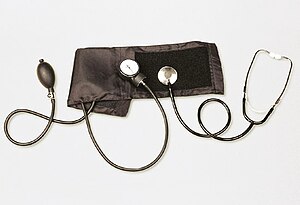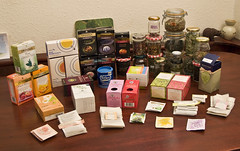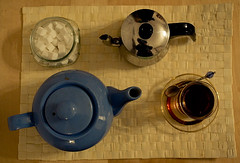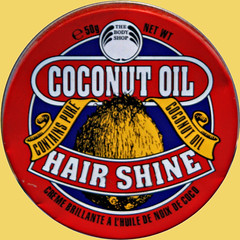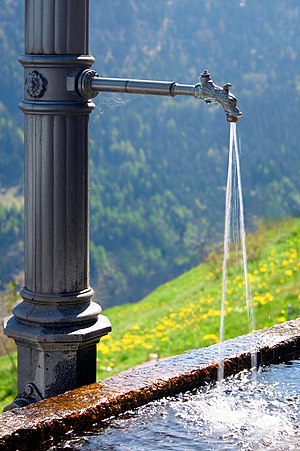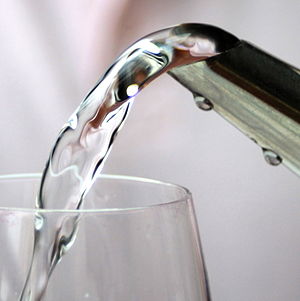Okay, rant time! :-) I know I haven't ranted in a while, but this morning's outing to the local Kroger got me all fired up....
After picking up some strawberries and organic butter (on sale for under $4 - yay!), I headed for the other side of the store, and found myself behind a fellow shopping with (presumably) his two sons. One was small - riding in the cart - the other was maybe 4 or 5 years old - cute little blond-headed boy. He apparently had been asking his dad if he could get a little treat (I didn't see what it was). All I heard was his dad's response:
"No, you can't have that - it's not good for you." Followed by - almost as an after-thought:
"Most things that taste good aren't good for you."
WHAT?? I almost interrupted right there, but I thought better of it. What good could come of confronting a well-meaning dad trying to educate his children? I really couldn't think of anything to say at that moment that would have made a positive difference, so I held my tongue, but inside I was stewing all the way home.
What a horrible thing to teach your children!
First of all, you're teaching your kids from a young age to feel guilty about eating things they enjoy (way to plant the seeds for a future eating disorder, dad!)
But
even worse, you're predisposing them to dislike (probably before even tasting) anything they would think of as "healthy."
|
|
| "The Healthy Eating Pyramid" (Yes, believe it or not, that IS a can of pop at the top right...) (Photo credit: Wikipedia) |
Basically that one statement will install a belief in those children that could very well lead to a short and unhealthy life - unless they are able to later overcome this early programming and learn to make choices based on reality on their own. (Which many do, and I think, hopefully, more and more lately.)
In my mind, I was less timid, and confronted the guy with a simple, "That's not true!" Then I would have held up the package of butter - "Look at this organic butter - it's 10 times healthier than the regular stuff, AND it tastes better too!" Then I envisioned an argument ensuing about whether or not butter itself is healthy. (Which it can be - in case you were wondering, in reasonable amounts, as long as it's from properly fed and cared for animals that eat what they're designed to eat (grass), and aren't pumped full of hormones, chemicals, and junk. Clean animal fat is a natural substance which supports a number of functions in the human body, and is the most compatible type of fat with the human body - after all - it's the closest thing to our own fat - which makes up most of our brains, the marrow of our bones, and the walls of every cell in our bodies).
But what good would that have done? The dad's own programming (probably from his own parents, not to mention the non-stop media garbage) would most likely have prevented him from even comprehending the truth of my argument.
I find it incredibly sad and frustrating that all the mainstream (and mostly well-intentioned) efforts out there towards "health" are heading in completely the wrong direction. And it's REALLY easy to see this! If all it took to be healthy was to strip the fat out of everything, we would be the healthiest nation in the world! Instead, after 20-30 years of "low-fat," "low-sodium," "reduced-everything", we find ourselves with the highest rate of cancers, heart disease, diabetes, obesity, (the list goes on) than ever before in history.
At some point, don't we have to take a step back and say, "
Okay, obviously this isn't working...."??? Maybe we were wrong? Maybe eggs aren't evil, and processed (and sugared) grain isn't the actual basis of a healthy diet??
And back to the dad's comment for a moment -
as I've mentioned before,
REAL healthy food is the best-tasting food there is!!! In fact, if you really think about it, the junk "foods" that are out there are packed full of artificial flavors - just to make us think they taste good! Because in actuality, the processed, washed, bleached, dried, ground, separated, cooked, and re-formed into patties/nuggets/flakes/puffs "food" that we think of as "good-tasting-not-healthy food" really tastes like crap! Which is why they add all the artificial flavorings, colors, coatings, etc. - to trick our bodies into thinking this tastes good - therefore it must be good for me!
Guess what? There's a reason that stuff tastes good....
God made us that way - so that our bodies would know what is good for them, and what they need. Our taste buds recognize when something is ripe (it's sweet) - meaning at the peak of nutrients, vitamins, antioxidants, etc., rich - meaning containing fats that naturally help sustain our bodies and brains, or simply good-tasting - meaning it's something that's okay to eat, and not poisonous (things that are naturally poisonous to us usually taste bitter, or simply "off", to our taste buds).
Natural, whole, real foods that God made for us to eat are the tastiest stuff on earth!
The problem is, we stripped everything out of these real, good, whole foods, for the sake of convenience and profit, and now they taste like crap, so we add chemical additives to them that taste
sort of like an imitation of what the actual food would taste like, so that we'll eat them....
HOW DOES THIS MAKE SENSE????!
Is it any wonder that we ended up where we are now? That of all the mammals on earth, we are the only species who live an average of 6 1/2 times our age at puberty (every other mammal lives 11-20 times)?
We're also the only species that messes with its food.... go figure.
It's time to take a look at where we are, and how we got here, and realize that to survive as a species we need to change direction (not just when it comes to health, but also our care for the environment, our management of our resources, etc. - but these are for another blog post! :-) Or visit our website for some ideas and solutions in these areas as well:
www.newholisticliving.com.).
We need a new definition of healthy that doesn't rely on the USDA food pyramid (aka USDA pile of crap - pardon my French). We need to get back to basics, and back to eating the food that God gave us to eat - and stop pretending to be God ourselves and trying to make His food "better" - it can't be done!! Our bodies were designed by Him, and He created what these bodies are meant to eat.
Real Food = Whole Food = Natural Food = Fresh Food = Real Health.
What do you think? Agree? Disagree? Got ideas of your own? Feel free to share below, and if you liked this rant, you may also find these posts of interest:
Why Healthy Food Tastes Good
How to Get Healthy By Shopping Local
Organic Foods for Improved Health?
All About Aspartame
Raw Food Diet Series (1st post)



